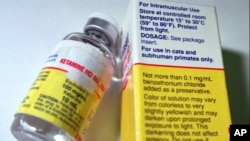Ketamine, a hallucinogen called "Special K" by drug abusers, is an animal tranquillizer that has shown promising results at lifting the dark veil of depression in those for whom other treatments, including antidepressants and psychotherapy, have not helped. Ketamine only works for a short period of time and researchers are looking for ways to extend its beneficial effects.
In one of the latest trials of ketamine carried out in Britain, low doses of the tranquilizer showed remarkable benefit in easing symptoms in a small percentage of 28 patients with serious depression.
The study, published in the Journal of Psychopharmacology, was led by psychiatrist Rupert McShane of Oxford University. Ketamine was given by IV injection in patients who were already on another antidepressant.
McShane says eight patients responded to the treatment, three of whom said they felt better almost immediately after a single infusion
“Typically by about six hours, people are saying, 'Gosh, I am feeling like a weight is lifted from me. I can think more freely.' That is in those who responded,” he said.
Among those who responded, the benefit lasted between one and six months. McShane notes the British trial was designed to test the safety of repeated doses, not the drug's effectiveness.
In the United States, where a half dozen larger trials of the anesthetic have been conducted, experts say ketamine has proved to be on average 60 percent effective in rapidly easing treatment-resistant depression.
U.S. National Institute of Mental Health experimental therapeutics chief Carlos Zarate says there are 30 types of antidepressant drugs on the market, but they do not relieve all of the symptoms of depression, which include extreme fatigue, sadness or inability to concentrate.
“And in addition, the incidences of depression and suicide have not dramatically changed over the years despite these treatments," he said. "And the other major factor [is] it often takes several weeks or months for the full effects to take place.”
Zarate says only about one-third of patients get a complete remission on one antidepressant. Many more require two or more trials of different drugs to ease symptoms.
Most of the antidepressants target the neurotransmitters serotonin and norepinephrine. Zarate says they work rapidly to improve the connections among the brain chemicals.
He says ketamine works directly on a neurotransmitter called glutamate, which is the ultimate target of other drugs.
“And so people have argued if you go more directly to this receptor of glutamate, NMDA, would you bring about a more rapid antidepressant effect," he said. "And the answer is yes, you can get what takes about a couple of hours with ketamine [which] would take approximately six weeks with our standard antidepressants.”
Research is now focused on the dosage of ketamine that can be administered safely, the goal of the British study, and trying to design longer lasting drugs that work like ketamine directly on the glutamate receptor.
In one of the latest trials of ketamine carried out in Britain, low doses of the tranquilizer showed remarkable benefit in easing symptoms in a small percentage of 28 patients with serious depression.
The study, published in the Journal of Psychopharmacology, was led by psychiatrist Rupert McShane of Oxford University. Ketamine was given by IV injection in patients who were already on another antidepressant.
McShane says eight patients responded to the treatment, three of whom said they felt better almost immediately after a single infusion
“Typically by about six hours, people are saying, 'Gosh, I am feeling like a weight is lifted from me. I can think more freely.' That is in those who responded,” he said.
Among those who responded, the benefit lasted between one and six months. McShane notes the British trial was designed to test the safety of repeated doses, not the drug's effectiveness.
In the United States, where a half dozen larger trials of the anesthetic have been conducted, experts say ketamine has proved to be on average 60 percent effective in rapidly easing treatment-resistant depression.
U.S. National Institute of Mental Health experimental therapeutics chief Carlos Zarate says there are 30 types of antidepressant drugs on the market, but they do not relieve all of the symptoms of depression, which include extreme fatigue, sadness or inability to concentrate.
“And in addition, the incidences of depression and suicide have not dramatically changed over the years despite these treatments," he said. "And the other major factor [is] it often takes several weeks or months for the full effects to take place.”
Zarate says only about one-third of patients get a complete remission on one antidepressant. Many more require two or more trials of different drugs to ease symptoms.
Most of the antidepressants target the neurotransmitters serotonin and norepinephrine. Zarate says they work rapidly to improve the connections among the brain chemicals.
He says ketamine works directly on a neurotransmitter called glutamate, which is the ultimate target of other drugs.
“And so people have argued if you go more directly to this receptor of glutamate, NMDA, would you bring about a more rapid antidepressant effect," he said. "And the answer is yes, you can get what takes about a couple of hours with ketamine [which] would take approximately six weeks with our standard antidepressants.”
Research is now focused on the dosage of ketamine that can be administered safely, the goal of the British study, and trying to design longer lasting drugs that work like ketamine directly on the glutamate receptor.




